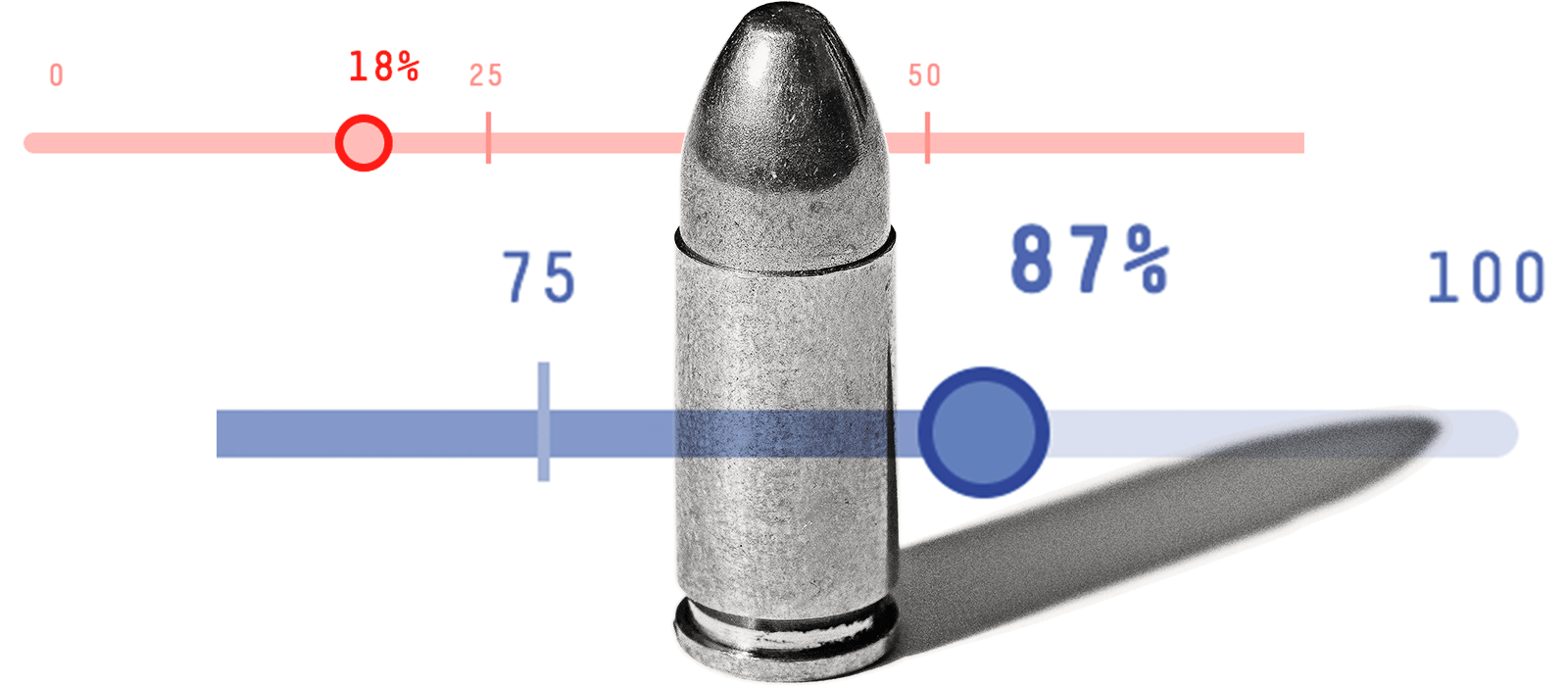Gun Control and Red State Blue State Comparisons

Just How Far Apart Are The Two Parties On Gun Control?
After what feels like a relentless sequence of high-profile mass shootings, Americans are once again debating whether the country needs stronger regulations on guns. Many lawmakers and activists contend that, even in a country as bitterly polarized as the United States, some gun-control measures actually attract wide support — whether Americans actually vote for the measures they say they support is another matter. However, when you compare specific questions by party response, there's a gap.
Consider background checks. Morning Consult and Politico asked about this gun-control measure in March 2021. How do you think Republicans and Democrats responded?
What percentage of Republican and Democratic respondents do you think said they "strongly" or "somewhat" support requiring background checks for all gun purchasers?
Guess
That's pretty close to consensus, but already we can see that even broadly popular measures like background checks aren't as appealing to some Republican voters as they are to Democratic voters. Let's take a look at some other measures. In April 2021, the Pew Research Center asked about barring people with mental-health issues from buying guns. How do you think Republicans and Democrats responded?
What percentage of Republican and Democratic respondents do you think said they "strongly" or "somewhat" favor preventing people with mental illnesses from purchasing guns?
Guess
Again, we see a lot of agreement from both sides of the political spectrum. But this question was a little vague — what does it mean to prevent people from buying guns? And which mental illnesses should be included? An APM Research Lab survey on Extreme Risk Protection Orders tried to go deeper by asking about these so-called "red flag" laws. These laws would allow family members, the police or certain other officials to seek an ERPO, a court order to temporarily take guns away from someone who may harm themselves or others. When asked whether they supported family-initiated ERPOs, how do you think Republicans and Democrats responded?
What percentage of Republican and Democratic respondents do you think said they "strongly" or "somewhat" support allowing a family member to seek a court order to temporarily take away guns if they feel a gun owner may harm themselves or others?
Guess
Once again, a majority of both Democrats and Republicans support this kind of measure, though the gap is wider. When asked whether they would support the police initiating such an action, support dropped among both groups, to 78 percent among Democrats and 66 percent among Republicans.
How about a law banning assault weapons, something that Congress passed in 1994 (but let expire 10 years later) and an option that President Biden recently promoted?
What percentage of Republican and Democratic respondents do you think said they "strongly" or "somewhat" favor banning assault-style weapons?
Guess
While Democratic support remains high, Republican support drops dramatically, even though the previous ban enjoyed some bipartisan support when it passed.
Another proposal that has been floated by politicians is allowing teachers to carry weapons in school. How far apart do you think Republicans and Democrats are in supporting this measure?
What percentage of Republican and Democratic respondents do you think said they "strongly" or "somewhat" favor allowing teachers and school officials to carry guns in K-12 schools?
Guess
While a majority of Republicans support this idea, it's not nearly as popular with them as some other measures — and it's clearly unpopular with Democrats.
But getting gun-control laws passed is not just about whether voters support certain measures but also about how passionate voters are that those measures will work. If a voter generally supports a new law but doesn't think it will actually change much, they may not be as active in supporting it. A 2019 poll by ABC News/The Washington Post asked about this:
What percentage of Republican and Democratic respondents do you think said they were "very" or "somewhat" confident that passing stricter gun-control laws would reduce mass shootings in this country?
Guess
However, when asked about improving mental-health monitoring and treatment, Republicans were much more confident that this would reduce mass shootings, even slightly more so than Democrats: 78 percent of Republicans said they were "very" or "somewhat" confident that this would work, and 75 percent of Democrats agreed.
Some differences in thinking about gun control may have to do with whether people own guns themselves.
What percentage of Republican and Democratic respondents do you think said they, or anyone in their household, own a gun of any kind?
Guess
Although most Americans don't own a gun, a small share own a lot of them, which is why the U.S. has more guns than people.
While both Democrats and Republicans support some gun-control measures, broad support for extensive gun control is its own constitutional knot thanks to the Second Amendment. In April, YouGov/The Economist asked Americans which was more important: the right of people to own guns or protecting people from gun violence. (Respondents could also say if they thought both were equally important.)
What percentage of Republican and Democratic respondents do you think said they believe the right of people to own guns is more important than protecting people from gun violence?
Guess
While a plurality of Republicans (49 percent) said both are equally important and a majority of Democrats (57 percent) said protecting people from violence is more important, the difference is striking. As the country debates how to end mass shootings like the ones that happen in the U.S. every day, this gap may be the most meaningful of all.
Source: https://projects.fivethirtyeight.com/gun-control-polling-2022/
0 Response to "Gun Control and Red State Blue State Comparisons"
Post a Comment